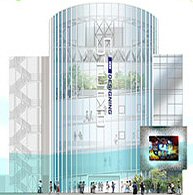Willcom to Bid for 2GHz Spectrum
Willcom Inc. has decided to bid for use of the 2GHz band that the Communications Ministry plans to offer to one 3G cellular phone service company this year, The Nihon Keizai Shimbun learned Monday. If approval is granted, Willcom plans to launch next-generation PHS service that will realize a data speed of 20-30 megabits per second — about 100 times as fast as current PHS services and equal to that of ASDL.


 KDDI has opened an Alpha Pup playland for its mobile universe right in the heart of Tokyo fashion central — Harajuku. Five floors of interactive phones and games,
KDDI has opened an Alpha Pup playland for its mobile universe right in the heart of Tokyo fashion central — Harajuku. Five floors of interactive phones and games,